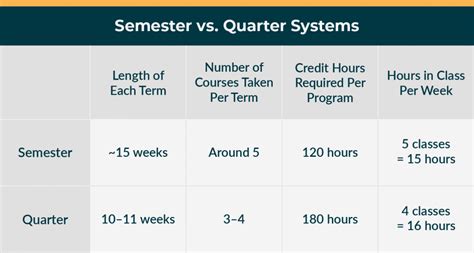One semester in college typically consists of 12-18 units. A unit is a measure of the amount of work required for a particular course. Most courses are worth 3 or 4 units.

Typical Course Load
The average full-time college student takes about 15 units per semester. This allows students to complete their degree requirements in four years. Of course, students can take more or fewer units depending on their individual needs and abilities.
Factors to Consider
Several factors can affect how many units a student takes per semester. These include:
- The student’s major: Some majors, such as engineering and science, have more rigorous coursework than others. As a result, students in these majors may need to take more units per semester.
- The student’s academic goals: Students who want to graduate early or who are planning on attending graduate school may need to take more units per semester.
- The student’s work schedule: Students who work part-time or full-time may need to take fewer units per semester to avoid overloading themselves.
- The student’s personal life: Students with family obligations or other commitments may need to take fewer units per semester to balance their responsibilities.
Benefits of Taking More Units
Taking more units per semester can have several benefits. These include:
- Graduating early: Students who take more units per semester can graduate early, saving them time and money.
- Pursuing a minor or double major: Students who take more units per semester can free up room in their schedules to pursue a minor or double major.
- Getting ahead in graduate school: Students who take more units per semester will have a stronger foundation when they enter graduate school.
Challenges of Taking More Units
Taking more units per semester can also have some challenges. These include:
- Increased workload: Taking more units per semester means having more work to do. Students need to be prepared to spend more time studying and completing assignments.
- Stress: Taking more units per semester can be stressful. Students need to manage their time wisely and make sure they are not overloading themselves.
- Burnout: Taking too many units per semester can lead to burnout. Students need to be aware of the signs of burnout and take breaks when necessary.
Conclusion
The number of units a student takes per semester is a personal decision. Students need to consider their individual needs and abilities when deciding how many units to take. By carefully considering these factors, students can make the best decision for their academic success.
1. How many units is a full-time student expected to take?
A full-time student is expected to take around 15 units per semester.
2. How many units is a part-time student expected to take?
A part-time student is expected to take around 6-9 units per semester.
3. Can I take more or fewer units than the recommended amount?
Yes, you can take more or fewer units than the recommended amount. However, you should consult with your academic advisor before doing so.
4. What are the benefits of taking more units?
The benefits of taking more units include graduating early, pursuing a minor or double major, and getting ahead in graduate school.
5. What are the challenges of taking more units?
The challenges of taking more units include increased workload, stress, and burnout.
6. How can I avoid burnout?
To avoid burnout, students need to manage their time wisely, take breaks when necessary, and get enough sleep.
Table 1: Average Number of Units per Semester by Year
| Year | Average Number of Units per Semester |
|---|---|
| Freshman | 12-15 |
| Sophomore | 15-18 |
| Junior | 15-18 |
| Senior | 12-15 |
Table 2: Benefits of Taking More Units
| Benefit | Description |
|---|---|
| Graduate early: | Students who take more units per semester can graduate early, saving them time and money. |
| Pursue a minor or double major: | Students who take more units per semester can free up room in their schedules to pursue a minor or double major. |
| Get ahead in graduate school: | Students who take more units per semester will have a stronger foundation when they enter graduate school. |
Table 3: Challenges of Taking More Units
| Challenge | Description |
|---|---|
| Increased workload: | Taking more units per semester means having more work to do. Students need to be prepared to spend more time studying and completing assignments. |
| Stress: | Taking more units per semester can be stressful. Students need to manage their time wisely and make sure they are not overloading themselves. |
| Burnout: | Taking too many units per semester can lead to burnout. Students need to be aware of the signs of burnout and take breaks when necessary. |
Table 4: Tips for Avoiding Burnout
| Tip | Description |
|---|---|
| Manage your time wisely: | Students should create a schedule and stick to it as much as possible. They should also break down large tasks into smaller, more manageable chunks. |
| Take breaks: | Students should take breaks throughout the day, even if it is just for a few minutes. They should also take a day off each week to relax and recharge. |
| Get enough sleep: | Students need to get enough sleep to function properly. They should aim for 7-8 hours of sleep per night. |
